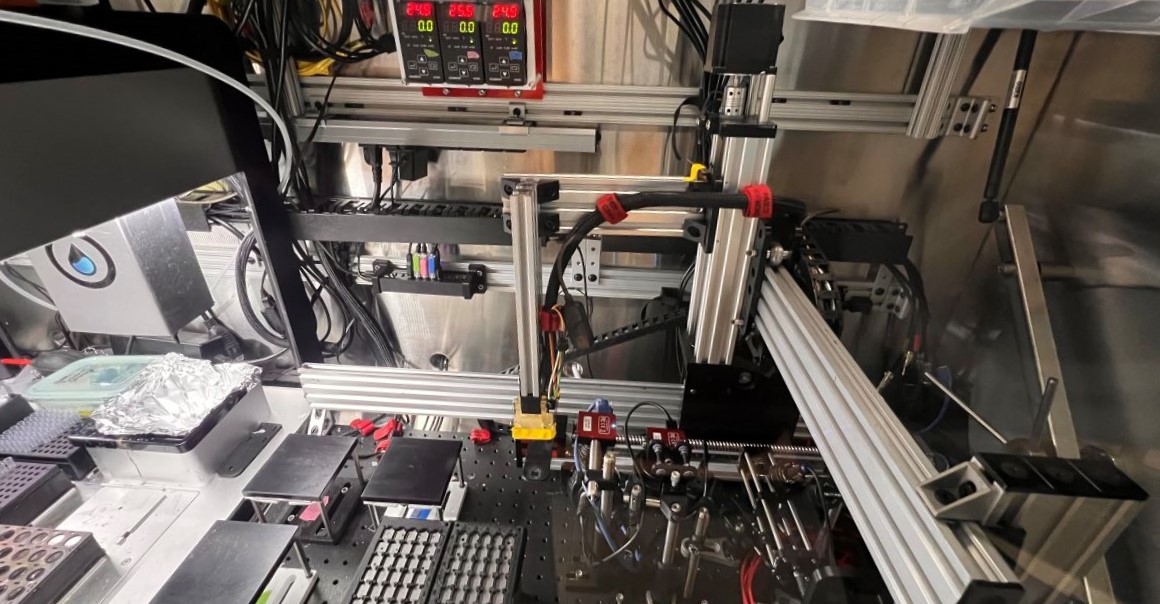University of California San Diego researchers have developed an automated material discovery and testing platform for tandem perovskite solar cell technologies. The robotic platform is multifunctional, able to mix precursors, perform spin coating, annealing and characterization of the optoelectronic thin films.
Focused initially on perovskite technology, it is called Perovskite Automated Spin Coat Assembly Line (PASCAL). It is suitable for composition engineering to improve the durability of perovskite absorbers for tandem solar cell applications, and screening triple-cation, triple-halide compositions.
“In our view, having a robot perform repetitive tasks is resource efficient, freeing up well-trained researchers for the higher-level tasks of hypothesis generation and testing,” David P. Fenning, corresponding author of the research, told pv magazine. “It also reduces noise in experimental data, increasing statistical power in experiments.”
The novel platform reportedly enables a rate of up to 430 sample depositions or measurements per day. “PASCAL automates fabrication of thin films by the standard spin coat procedures employed in manual processes, albeit with precision, control, and record keeping surpassing that of human operators,” stated the researchers.
PASCAL enables extensive compositional screening and a capacity to analyze 58 “unique compositions” within the complex realm of triple-halide, triple-cation compositions. It also supports coating reproducibility as demonstrated in the work by the team.
“With this screening dataset, we leverage machine learning to develop a durable composition that displays nearly zero photoluminescence peak shifts under both 85 C and approximately 4-sun photo exposure,” said the academics.
The composition was then made into single-junction prototype devices. In the characterization line are cameras, LED, and laser excitation sources, a halogen lamp, and a spectrometer. It can generate a standard dataset of darkfield, brightfield, photoluminescence, and transmittance data, stored for each sample.
The complete system is controlled from a single computer using a customized Python library.
Looking at the results, the research asserted the efficacy of PASCAL specifically for automation of solution-processed optoelectronic thin film research. The approach, the hardware, and data are “evidence that automated platforms are an opportunity to accelerate the identification and discovery of novel thin film materials.” The accessibility of low-cost robotics and open-source communities for automation was an enabler, noted Fenning.
The platform was presented in the study “PASCAL: the perovskite automated spin coat assembly line accelerates composition screening in triple-halide perovskite alloys,” published in Digital Discovery.
Feedback from industry and the research community has been positive. “We have heard a lot of encouragement and excitement from early career to very senior researchers both in industry and academia. I think our most significant input to them might be that it's not as hard or expensive as it might have once been, given the advances in robotics and open-source platforms available,” said Fenning,
Looking ahead, Fenning said, “Operational stability is the name of the game for perovskites. We are working on studies connecting durability to chemical and process variations using the low-noise experimental foundation provided by PASCAL.”
He added that the PASCAL platform is supporting research for “scale up of perovskite processing” at a new research center led by the Massachusetts Institute of Technology (MIT), which received funding from the U.S. Department of Energy Solar Energy Technologies Office (SETO). It is called Accelerated Co-Design of Durable, Reproducible, and Efficient Perovskite Tandems, dubbed ADDEPT, a national center that includes university research teams from the University of California San Diego, Princeton, and MIT, as well as industrial partners, CubicPV and Verde Technologies.
This content is protected by copyright and may not be reused. If you want to cooperate with us and would like to reuse some of our content, please contact: editors@pv-magazine.com.



By submitting this form you agree to pv magazine using your data for the purposes of publishing your comment.
Your personal data will only be disclosed or otherwise transmitted to third parties for the purposes of spam filtering or if this is necessary for technical maintenance of the website. Any other transfer to third parties will not take place unless this is justified on the basis of applicable data protection regulations or if pv magazine is legally obliged to do so.
You may revoke this consent at any time with effect for the future, in which case your personal data will be deleted immediately. Otherwise, your data will be deleted if pv magazine has processed your request or the purpose of data storage is fulfilled.
Further information on data privacy can be found in our Data Protection Policy.